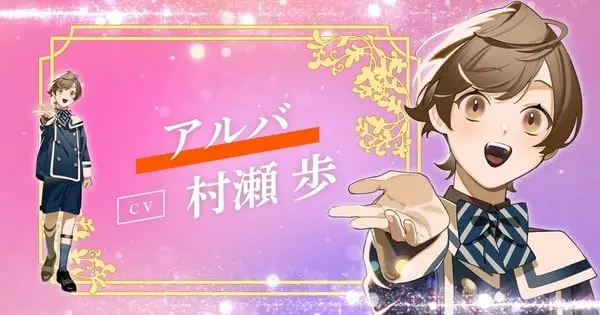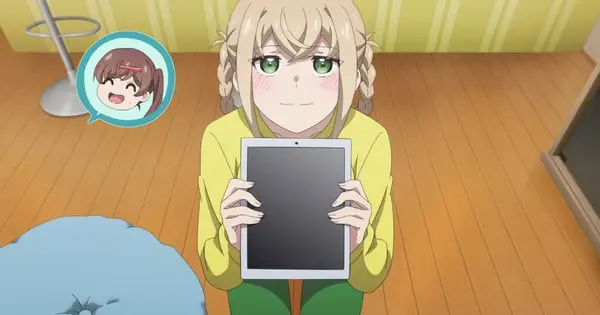The demanding, often chaotic world of manga creation takes another delightfully unexpected turn in Episode 5 of A Mangaka’s Weirdly Wonderful Workplace (Egao no Taenai Shokuba Desu), titled “My Senpai Calls Herself My Rival.” As novice mangaka Nana Futami grapples with creative blocks and the incessant pressures of deadlines, her professional and personal space is dramatically invaded by a figure from her past, injecting a potent mix of rivalry, vulnerability, and a touch of the absurd into her already turbulent life.
The Ever-Pressured World of Nana Futami
Nana Futami’s journey as a budding shojo manga artist is rarely smooth. She’s continually battling stomach aches from stress, pushing deadlines, and struggling to progress on her storyboards for her beloved shogi manga, Dear Subaru. Her vivid imagination, prone to wild delusions, often adds an extra layer of comedic self-doubt and anxiety to her creative process. Despite the steadfast support of her cool editor, Kaede Satou, and reliable assistant, Mizuki Hazama, the mental and emotional toll of the manga industry remains a constant challenge for Nana.
A Rival’s Unexpected Entrance: Arisa’s Arrival
Episode 5 delivers a significant new character who literally crashes into Nana’s life: Arisa, Nana’s former senior during her assistant days. Arisa’s entrance is far from graceful; she appears at Nana’s doorstep in a disheveled, inebriated state, immediately declaring herself Nana’s rival. This dramatic and somewhat comical introduction sets the stage for much of the episode’s humor and underlying emotional depth.
The Weight of Cancellation and Creative Block
The reason for Arisa’s distressed arrival soon becomes clear: her own serialized manga has been canceled. This revelation highlights the harsh realities and fickle nature of the manga industry, where even established creators can face the sudden end of their work. Arisa’s public unraveling serves as a stark reminder of the emotional toll creative endeavors can take, showcasing her deep sadness and lack of sleep stemming from the cancellation.
Coincidentally, Nana herself is wrestling with a creative block, struggling to conceptualize a rival character for her own manga’s protagonist. Her inherently kind nature makes it difficult for her to imagine true rivalry, viewing everyone around her as supportive rather than competitive. Arisa’s messy, fiery, and somewhat ridiculous energy, despite her personal turmoil, inadvertently provides Nana with the perfect template for the rival character she so desperately needs. This clever narrative device intertwines their professional struggles and offers a path forward for Nana’s story.
A Performance of Contrasts: Arisa’s Characterization
Arisa’s character in Episode 5 is notably “cartoonish” and is brought to life by an impressive vocal performance from Yū Kobayashi. Kobayashi’s ability to switch between a pompous, almost boyish tone when declaring rivalry and the voice of a distraught, older woman contributes significantly to the episode’s comedic impact. This dynamic portrayal underscores Arisa’s bravado as a defense mechanism, masking her genuine upset over her manga’s cancellation. Her presence is designed to be entertaining, and much of the episode’s humor stems from her over-the-top reactions and declarations.
Shifting Dynamics and Future Prospects
The episode culminates with Arisa, temporarily homeless, being offered a spare room at Nana’s workplace. This unexpected development instantly shakes up the existing team dynamic, which previously consisted of Nana’s overthinking, Mizuki’s quiet patience, and Kaede’s professional demeanor. Arisa’s whirlwind energy promises a new, unpredictable resident, adding another layer of “weirdly wonderful” chaos to the workplace. Despite her initial breakdown, Arisa resolves to finish the final chapters of her canceled series with renewed determination before planning her comeback.
Conclusion
Episode 5 of A Mangaka’s Weirdly Wonderful Workplace is a compelling blend of humor, heart, and the harsh realities of the manga industry. By introducing Arisa, a senior mangaka dealing with the cancellation of her series, the anime not only provides Nana with a solution to her creative block but also explores the emotional fragility beneath the polished facade of manga creation. The episode expertly balances its comedic elements with raw honesty, reminding viewers that behind every published (or canceled) manga is a creator navigating a complex world of deadlines, dreams, and unexpected challenges. With Arisa now integrated into Nana’s peculiar workplace, the stage is set for an even more turbulent yet wonderfully inspiring dynamic in future episodes.










